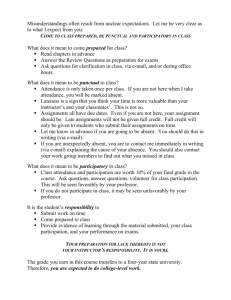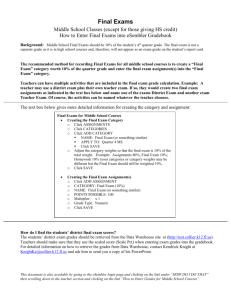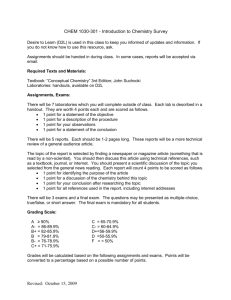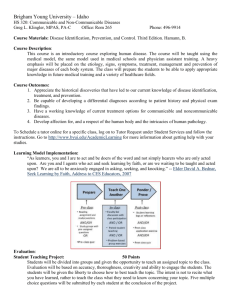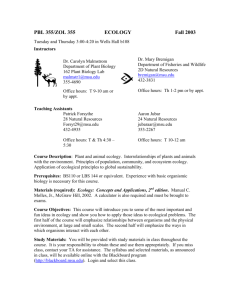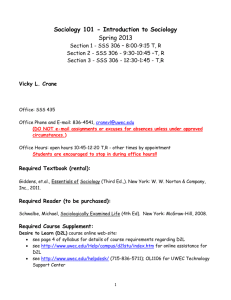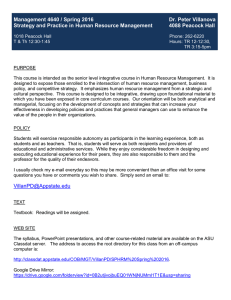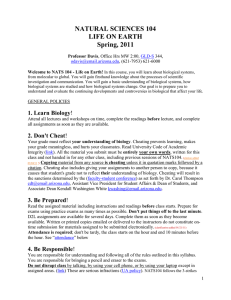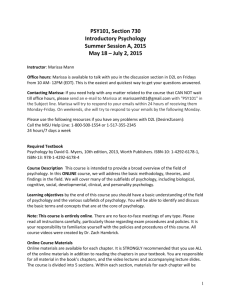middle childhood and adolescence
advertisement
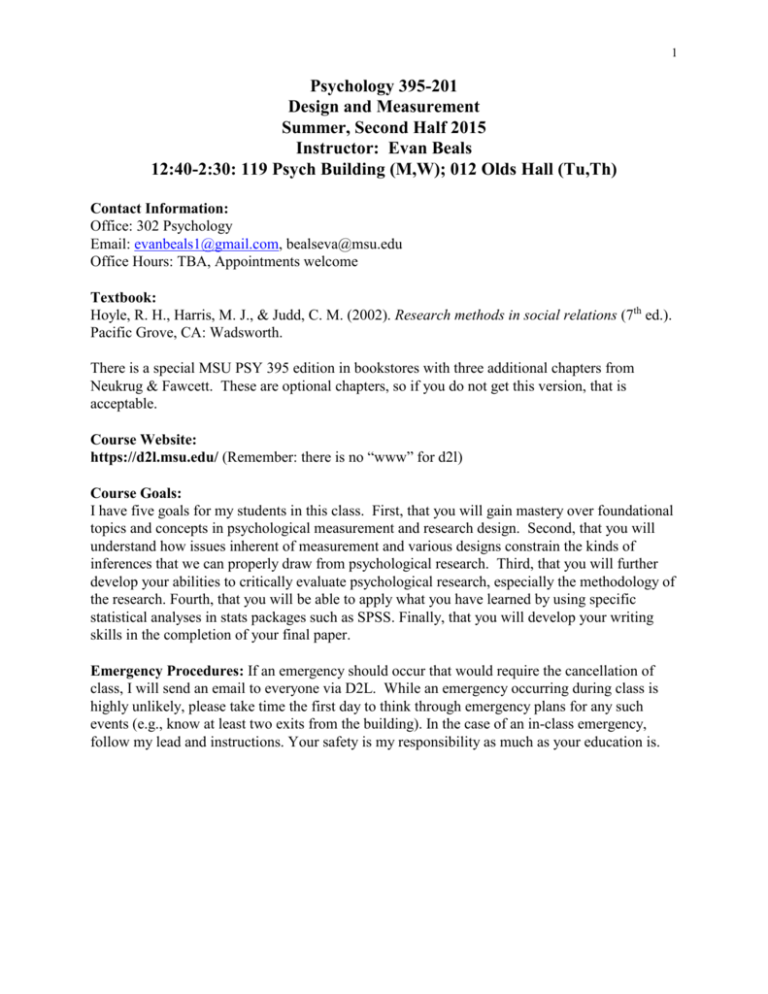
1 Psychology 395-201 Design and Measurement Summer, Second Half 2015 Instructor: Evan Beals 12:40-2:30: 119 Psych Building (M,W); 012 Olds Hall (Tu,Th) Contact Information: Office: 302 Psychology Email: evanbeals1@gmail.com, bealseva@msu.edu Office Hours: TBA, Appointments welcome Textbook: Hoyle, R. H., Harris, M. J., & Judd, C. M. (2002). Research methods in social relations (7th ed.). Pacific Grove, CA: Wadsworth. There is a special MSU PSY 395 edition in bookstores with three additional chapters from Neukrug & Fawcett. These are optional chapters, so if you do not get this version, that is acceptable. Course Website: https://d2l.msu.edu/ (Remember: there is no “www” for d2l) Course Goals: I have five goals for my students in this class. First, that you will gain mastery over foundational topics and concepts in psychological measurement and research design. Second, that you will understand how issues inherent of measurement and various designs constrain the kinds of inferences that we can properly draw from psychological research. Third, that you will further develop your abilities to critically evaluate psychological research, especially the methodology of the research. Fourth, that you will be able to apply what you have learned by using specific statistical analyses in stats packages such as SPSS. Finally, that you will develop your writing skills in the completion of your final paper. Emergency Procedures: If an emergency should occur that would require the cancellation of class, I will send an email to everyone via D2L. While an emergency occurring during class is highly unlikely, please take time the first day to think through emergency plans for any such events (e.g., know at least two exits from the building). In the case of an in-class emergency, follow my lead and instructions. Your safety is my responsibility as much as your education is. 2 GRADES: There are a total of 450 points in this class, broken down as such: Task Attendance/Quizzes Two Exams Eight Lab Homework Exercises Final Project Extra Credit Points 50 points 100 points each for a total of 200 points 10 points each for a total of 80 points 120 points May be available throughout the semester but is not currently planned Your final grade is based on the total number of points earned in this course. I will assign exact point grades based on this outline: 4.0 3.5 3.0 2.5 2.0 1.5 1.0 0.0 405+ 382.5 to 404.9 360 to 382.4 337.5 to 359.9 315 to 337.4 292.5 to 314.9 270 to 292.4 Fewer than 270 These cut-offs are inflexible. If you become concerned about falling on the wrong side of the cutoff, completing the items listed above (including potential extra credit) are the only ways for you to impact your grade. Exams: The exams will consist of multiple-choice questions. Exam 1 is scheduled for July 29, and Exam 2 is scheduled for August 20. The second exam will focus on material that we cover in the second half of class, and so is not technically cumulative. That being said, this material does build on itself, so elements from the first half may be important to the final. Make-up exams require a certified medical excuse or a documented personal emergency. Homework Exercises: Homework exercises will be given during our lab sessions. Their intention will be to help you understand both the course concepts and their application. Complete homework must be turned in before our next lab session. No late work will be accepted. There are eight exercises each worth 10 points. You must do your laboratory assignments independently (although I will allow some student-student help if we work on them in class) and each person should turn in their own unique work (i.e., no homework collaborations are allowed in PSY 395). Failure to follow this requirement may result in zero points for your homework (one or all assignments) and zero extra credit opportunities. Final Project: The final project is worth 27% of your course grade. This project takes the form of a research proposal and several of our laboratory sessions will include explanations of the paper piece by piece. Your paper must be well-written and it will be evaluated on writing clarity and the correct use of APA style, as well as content. Read Chapter 20 of the text before you write this paper. The deadline for the project is Wednesday August 19 at 5:00 p.m. However, 3 you are strongly encouraged to submit the project earlier that week if you wish. No late projects will be accepted. Attendance: I will be taking attendance which will contribute to your grade. As this course is compressed into only a handful of weeks, it is very important that you be here every day. If you know ahead of time of days that you cannot make it, please talk with me and we can make arrangements. Class Learning Environment: I see our class as a learning community where courtesy and respect are integral for everyone’s success. I expect that you will come to all our meetings on-time, prepared to learn, and ready to contribute. Since we are a small class, I will expect participation and discussion from everyone throughout the term. Moreover, please do not engage in distracting behaviors during scheduled course meeting times. For example, do not be doing non-related work on your computer, using your phone, having side-conversations, or leaving in the middle of class in a way that is disruptive. Lecture Slides: I will post the lecture slides the morning of each class. I want to make these available so that you can focus your attention on processing lecture material and actively participating in discussions rather than trying to keep up with the slides. That being said, some material in lectures will not be explicitly covered by the slides. Ergo, having access to the slides gives you no excuse to skip class time. Extra-Credit: I may allow for or create extra-credit opportunities during the course of the class, depending on how I think the class is doing. Be aware that I do not guarantee that this will be an option. If you are doing all the work for the class, then you should get a strong grade. Accommodations: If you have a disability that will require accommodations, please see me the first week of class. If you will miss class for a religious observance, let me know in advance. (See Attendance) Academic Integrity: It is unacceptable to cheat or plagiarize in any way. I expect you to complete all exams and any other assignments independently, or only using collaboration explicitly deemed acceptable by me. On the exams, that means no collaboration whatsoever. This should go without saying. If you are caught cheating on an exam or plagiarizing on the final paper, you may receive a zero for the course. Students caught plagiarizing homework assignments will receive a ZERO for ALL homework assignments. If you are not already, familiarize yourself with MSU definitions regarding academic dishonesty. Ignorance is not an excuse. Legalistic Details: Article 2.3.3 of the Academic Freedom Report states that "The student shares with the faculty the responsibility for maintaining the integrity of scholarship, grades, and professional standards." The Department of Psychology adheres to the policies on academic honesty as specified in General Student Regulations 1.0, Protection of Scholarship and Grades; the all-University Policy on Integrity of Scholarship and Grades; and Ordinance 17.00, Examinations. For extensive details see Spartan Life: Student Handbook and Resource Guide and/or the MSU Web site.

